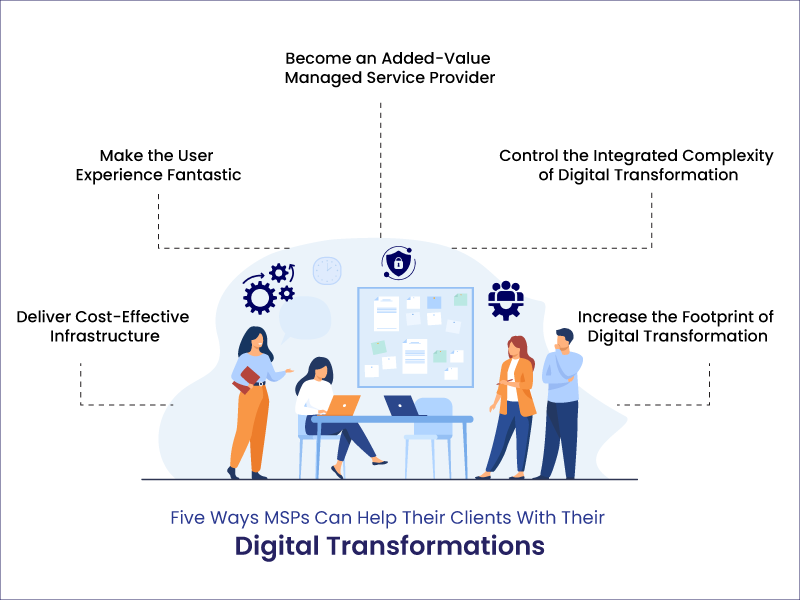
Traditional corporate strategies are struggling to cope with the burgeoning demands triggered by the COVID-19 outbreak. Supply chains are widely disrupted, the government’s mandate shuts down, and consumer behavior is shifting. However, the reality is that many conventional company models were already suffering the strains of a shifting working world.
Managed service providers(MSPs) are uniquely positioned to assist and advise businesses as they move toward digital transformation strategies. They can assist their clients with process navigation, better communication, and improved productivity.
Organizations nowadays must decide between two important issues. How can one be digitally agile in the best possible way? And how can we contract out IT services to a third party so that our in-house IT personnel can focus their technical knowledge on more challenging jobs? Both of these queries have a managed service as their solution.
Businesses are increasingly becoming digital. By offering services like real-time chat, mobile channels, and video collaboration, MSPs can help their clients conduct business more successfully, quickly, and affordably. This can advance their relationship with their clients.
Require Digital Transformation? Schedule A Call
What Are Managed IT Services?

Managed IT services provide various distant hybrid IT options, with responsibilities ranging from focused on-demand assistance to 24x7x365 coverage of IT tasks. Organizations can use managed IT solutions to decrease their internal IT staff’s burden or fill gaps in IT responsibilities and expertise. These services are offered for both private cloud storage and on-premises IT.
Managed IT service providers can lower internal costs, boost IT effectiveness, and enhance uptime management. First, however, to ensure adherence to national and international regulatory entities. Companies must ensure prospective MSPs correctly uphold privacy and data protection regulations.
The managed service provider must ensure that the service or equipment covered by an SLA is in good working order. The SLA includes technical support, help desk operations, disaster recovery, and typical downtime. The client often pays for the service via a monthly subscription.
Managed services examples include technological solutions like:-
- Software as a Service (SaaS)
- Desktop as a Service (DaaS)
- 24/7 accessibility to outside IT service providers
- Cloud
- Managed Hosting
What Types of Services Are Most Frequently Used?
Although managed IT service providers can include a wide range of duties, they often include:
- Hardware and infrastructure are remotely monitored and managed.
- Services related to security include monitoring, threat hunting, penetration testing, or incident response.
- Cloud service management, monitoring, and configuration. These services may be provided with managed cloud services or alone.
- Support for communications, including IP telephony services.
Useful link: Managed IT Services (MSP) – Overview, Importance and Benefits
5 Ways MSPs Can Help Their Clients With Their Digital Transformations
1) Deliver Cost-Effective Infrastructure
The fundamental infrastructure required to drive digital transformation is frequently expensive and complex. It requires products from numerous vendors at all levels of the technology stack. This includes creating the middleware, rolling out mobile solutions, and managing online chat networks. Putting everything together is necessary to enable meaningful digital business transformation consulting.
MSPs have extensive experience managing complicated technology platforms on their clients’ behalf. As a result, they can assist businesses in undergoing a digital transition without having to spend all the time and money upfront looking for infrastructure solutions.
2) Make the User Experience Fantastic
MSPs should identify problems as they arise and troubleshoot them before they significantly impact the client experience. For instance, consider a scenario where a consumer utilizes a new video chat service, and the stream occasionally breaks up due to a poor network connection. When such a problem occurs, the MSP can use performance-management tools to identify and resolve the problem quickly. Although it may seem simple, it’s not. An advanced communications system’s bug detection process might be exceedingly challenging.
MSPs can proactively check and assess the quality if they have the appropriate technologies. And the effectiveness of digital transformation technology, as well as making sure the platform is always available. This includes testing outside of the environment as well as inside it. As a result, customers should be able to embark on their transformational journeys knowing that their MSPs can provide what is required on time and with reliability.
3) Become an Added-Value Managed Service Provider
It’s insufficient for an MSP to be the sole infrastructure provider in today’s highly competitive environment. Yes, clients have used MSPs for technology platform outsourcing for years. However, these clients now expect their MSPs to assist in managing the solutions supporting digital transformation services. For instance, consider video collaboration tools. Businesses seek MSPs to assist them in achieving more with these technologies—to boost customer engagement and dramatically increase performance.
MSPs can profit from this as well. As more businesses start the process of going digital, MSPs have the chance to offer value-added services that go beyond essential infrastructure. And turn into actual business partners.
4) Control the Integrated Complexity of Digital Transformation
Most businesses do not currently use a unified digital transformation managed services platform. Instead, they use various platforms from various vendors. To succeed, they must manage, monitor, and optimize this multi-vendor environment successfully. Take Skype for Business as an example. This collaboration tool may make the UC environment even more complex, making it more difficult to manage everything at once.
Skype has a strong ROI. Yes, but if a corporation spends time and money learning and operating a new system, the ROI can quickly decline. Conversely, MSPs are skilled at integrating all the moving elements. It would help to have the proper hardware, software, network components, gateways, phones, and headsets to get the most out of a system like Skype for Business. The customer may concentrate on enjoying the benefits while the MSP manages the complexities.
5) Increase the Footprint of Digital Transformation
The good news for MSPs is that a digital transformation strategy is a lengthy project that happens gradually. For instance, suppose an MSP can successfully restructure one area of a company’s business. It then has the evidence to recommend that the business repeat the procedure in other areas of its operation. In addition, companies can rapidly and easily activate digital transformation trends capabilities in new divisions or satellite offices with the aid of an MSP. As a result, MSPs can benefit from economies of scale while assisting clients in hastening their digital transition.
Managed Services May Be the Solution for Transformation and Rebuild

Supply chains have been widely disrupted, the government has mandated shutdowns, and consumer behavior has changed. However, the reality is that many traditional company models were already feeling the strain of a shifting workplace:
- Crucial functions must be accomplished more with less non-substantiation. Nonetheless, board-critical activities like risk, compliance, finance, and tax are meant to increase efficiency without needing more resources.
- Keeping up with regulatory requirements is more complex and expensive. Rules are changing quickly in different jurisdictions, and regulators want better transparency.
- Cost reduction is crucial as management teams chase new technologies and improve efficiency measures.
- Keeping up with competitors is a difficult task. Requires specialized talent to manage them and extensive industry knowledge, data analytics, and digital technologies.
- Board requirements are increasing, and performance and return on investment are being held to higher standards.
This indicates that in various situations, the lack of skills prevents firms from undergoing digital transformations and is a barrier. A managed services business model widens the innovation landscape. It allows businesses to benefit from what new technologies and solutions offer, especially if they are as complex as a solution for content services. However, a managed services model gives enterprises access to information, talent, and tools to help them accomplish digital workplace transformation. The benefits of digital transformation are efficiency, contractual terms, and better uptime management.
Useful link: 10 Business Benefits of Managed IT Services
Conclusion

According to experts, digital transformation strategies are occurring everywhere. One must go digital to thrive and survive in the current business environment. And rightly so, since digital transformation makes improving every aspect of your company possible. From streamlining and modernizing processes to increasing agility and cutting costs, all while improving the customer experience. Digital Transformation Managed services providers can fill the gap and advance your business and employees.
A plan for digital transformation supported by an established managed service provider like Veritis, the Stevie Award Winner. By emphasizing IT as a tool to transform businesses and produce measurable business results, Veritis supports businesses’ access to process excellence. Approach us to learn more about digital transformation managed services.
For Digital Transformation Solutions, Schedule A Call
Additional Resources:
- What is Cloud Migration? Strategy, Process, and Tools
- Cloud Adoption Strategy: Which Approach Would be Most Effective for Your Company?
- What are the Different Types of Cloud Computing Services?
- How Does Cloud Computing Help Fintech?
- What is Cloud Security Posture Management?
- Cloud Computing: Trends, Challenges and Benefits
- What is Cloud Computing Security?
